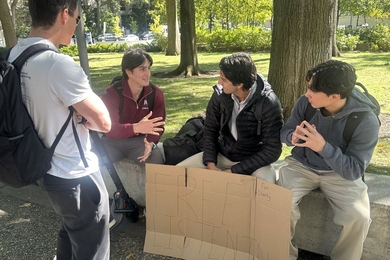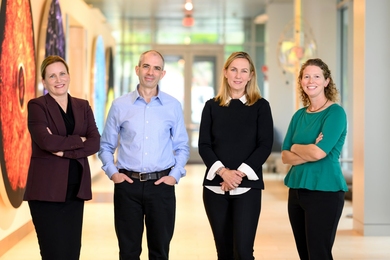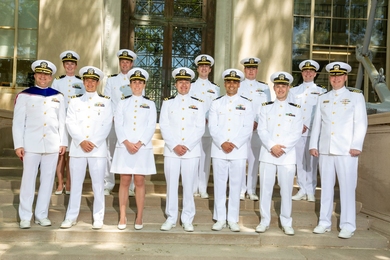The president of the class of 1996, a veteran professor and the head of the Nuclear Regulatory Commission have received the 1996 Dr. Martin Luther King Jr. Leadership Awards, given to those whose activities exemplify the ideals of the assassinated civil rights leader.
The awards were presented at a breakfast that marked MIT's 22nd annual celebration of Dr. King, held on February 16 at the Sala de Puerto Rico. Recipients were:
- Matthew J. Turner, a senior with a double major in architecture and mechanical engineering.
- Professor Emeritus Leon Trilling of the Department of Aeronautics and Astronautics.
- ������������������Dr. Shirley Jackson, a physicist and member of the Class of 1968 who is chairperson of the Nuclear Regulatory Commission.
The recipients, selected by the Martin Luther King Jr. Celebration Committee co-chaired by Dean Leo Osgood Jr. of the Office of Minority Education and Professor Michael Feld of the Department of Physics, received their awards from President Charles M. Vest.
Dr. Vest drew on material prepared by the MLK Committee as he presented the awards:
MATTHEW TURNER
Matt was selected for this award because of his sustained efforts in making MIT a better place for students, and in promoting better relations between students from different groups and diverse backgrounds. He is an eloquent and effective leader. who cares about his community. He has vision and he knows how to bring others together to achieve a common vision. Matt, your fostering of better communication between the Interfraternity Council and the historically black fraternities, your work with the Faculty Policy Committee, your service as president of your fraternity and president of the senior class, your dedication as an associate [student] advisor and your work as a volunteer in the wider Cambridge community all carry the mark of a true leader. By your vision and leadership, you have brought people together and enhanced the quality of life at MIT. In so doing, you represent the very best of what Martin Luther King expected of himself and others."
PROFESSOR LEON TRILLING
Professor Tilling was chosen to receive this award because of his deep and enduring commitment to improving the quality of education for people of color. His long-standing and steady efforts have ranged from pioneering work with Boston's METCO program more than 30 years ago to his ongoing work at MIT to articulate and nurture the benefits of diversity in our learning environment. For three decades he has worked to create more effective ways to introduce young minority scholars to advanced science and engineering and to recruit and serve as mentor to minority faculty members. His leadership in such activities as the Office of Minority Education, the MIT Second Summer Program and the Course XVI Outreach Committee all testify to his commitment and ability to help make MIT a more enriching and better place for all of its members. Leon, as an engineer, educator, role model and mentor, you have incorporated the notions of inclusion and diversity not simply as theoretical constructs, but as day-to-day practices in your life. In so doing, you represent the essence of Martin Luther King's philosophy and vision."
DR. SHIRLEY JACKSON
Shirley received her bachelor's degree in physics from MIT in 1968, and in 1973 she became the first African-American woman to receive the PhD from MIT. Her career as a physicist has been conducted in both industrial and academic settings. For 15 years, she was a research physicist at AT&T Bell Labs and later became a professor of physics at Rutgers University. In addition, she has served in numerous advisory capacities for the profession and for the federal government. She is also a life member of the MIT Corporation and has served as a member of its Executive Committee. During the past year, she has taken leave from these responsibilities in order to serve as chair of the Nuclear Regulatory Commission, the agency responsible for the civilian use and disposal of nuclear materials in the United States. Throughout her career, Dr. Jackson has demonstrated a distinguished and unwavering commitment to physics and higher education, and she has served as a leader, role model and mentor to so many people at MIT and throughout the scientific community. Shirley, your dedication to excellence in all that you do is a fitting tribute to Dr. King's legacy."
President Vest, noting that the awards celebrate leadership, said that the presidential primary campaigns now being waged are "evidence that we are suffering from a lack of leadership. The candidates are not presenting visions of what our society can be, or could be, or should be. Rather, most are feeding the fears and increasing the gulfs among us. That is not leadership. And when there is no leadership, whoever is willing to jump into the vacuum fills it. MIT Professor Stephen Ansolabehere has shown [in a recent book] that negative campaigning simply drives citizens out of the political process. They tune out, and they drop out. But leadership and jumping in-that is where we come in. It is the special responsibility of colleges and universities to exercise leadership and to prepare the next generation for leadership."
MIT students, he said, are expected to play pivotal roles in a changing society, and "slowly, but increasingly, our students come from a wider variety of racial and ethnic backgrounds."
About one-third of today's freshmen come from homes in which two languages are spoken, he said. More than 40 percent of them are women. At the graduate level, about one-third are from other countries. More than 40 percent of MIT's undergraduates are members of US minority groups, and 15 percent are underrepresented minorities.
"We are coming to understand our common stake in the global environment and the global economy, yet there is a terrifying resurgence of nationalist and ethnic conflict in many countries. We all have a common stake in the solution to such problems."
There is an old saying, Dr. Vest went on, that "a leader is one who takes us elsewhere," a person who produces change.
"Martin Luther King was such a leader. We need more such leaders. The most successful leaders will be those who not only have the ideas and the vision, but the ability to draw on the talents of women and men from the full spectrum of national, economic, cultural and racial backgrounds. These are qualities that we must emphasize in our educational programs and in the way we live and work together at MIT. If we can do it here, it will be an important step toward achieving greater justice in society as a whole."
The mistress of ceremony at the breakfast was Ivette M. Johnson '96, chair of the Office of Minority Education's Student Advisory Council. The Rev. Jane Soyster Gould, Episcopal chaplain at MIT, gave the invocation and benediction. C. Kareem Howard '99, and Simonetta A. Rodriguez, a PhD student, presented reflections on Dr. King. David C. Hackett '98, was the pianist.





